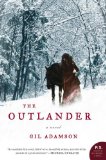Summary | Excerpt | Reading Guide | Reviews | Beyond the Book | Readalikes | Genres & Themes | Author Bio

Chapter One
It was night, and dogs came through the trees, unleashed and howling. They burst from the cover of the woods and their shadows swam across a moonlit field. For a moment, it was as if her scent had torn like a cobweb and blown on the wind, shreds of it here and there, useless. The dogs faltered and broke apart, yearning. Walking now, stiff-legged, they ploughed the grass with their heavy snouts.
Finally, the men appeared. They were wordless, exhausted from running with the dogs, huffing in the dark. First came the boy who owned the dogs, and then two men, side by side, massive redheads so close in appearance they might be twins. Dabs of firefly light drifted everywhere; the night was heavy with the smell of manure and flowering apple and pear. At last, the westernmost hound discovered a new direction, and dogs and men lurched on.
The girl scrambled through ditchwater and bulrushes, desperate to erase her scent. For a perilous moment she dared to stop running, to stand motionless, listening, holding her dark skirts out of the water. In the moonlight, her beautiful face was hollow as a mask, eyes like holes above the smooth cheeks. The booming in her ears faded slowly, and she listened to the night air. No wind through the trees. The frogs had stopped shrilling. No sound except the dripping of her skirts and, far away, the dogs.
Nineteen years old and already a widow. Mary Boulton. Widowed by her own hand.
The girl stood in her ditch under a hard, small moon. Pale foam rose from where her shoes sank into mud. No more voices inside her head, no noise but these dogs. She saw her own course along the ground as a trail of bright light, now doused in the ditchwater. She clambered up the bank and onto a road, her stiff funeral skirt made of bedspread and curtain, her hair wild and falling in dark ropes about her face. The widow gathered up her shawl and fled witchlike down the empty road.
At daybreak she was waiting for a ferry, hooded and shivering in her sodden black clothes. She did not know where she was but had simply run till the road came to an end, and there was the landing. A grand, warning sunrise lay overhead, lighting the tips of the trees, while the ground was in shadow and cold. The hem of her skirt was weighed down by mud. She whispered in camaraderie with herself, the shawl about her ears, while another woman stood uneasy by the empty ticket booth and held her children silent. They all watched her with large eyes. Even the smallest seemed to know not to wake the sleepwalker. Out above the river's surface, fat swallows stabbed at unseen bugs and peeped to one another in emotionless repetition. The ferry sat unmoving on the other side, a great flat skiff with a pilot's cabin in the rear.
The widow considered the ticket booth, realizing suddenly that she had no money. Behind her was the long, vacant road she had come down. It was stick-straight and lined with trees, and at the limit of sight it bent to the left where no movement, no human shape was yet visible. Her mind had cleared a little because she felt less afraid, and she now saw the world around her in a sharper, simpler way. Even the wind, rising and subsiding and fluttering her collar, followed a less ornamented rhythm than before. She could see it blowing, an infinite number of slack lines waving before her.
A boy on the other side of the river came to the edge of the bank and waved. One of the children waved back. He put his hands to his mouth and hollered. A man's voice hollered back. The widow turned to see a tall figure in coveralls coming down the road, his hand aloft. He must have emerged from an unseen path through the trees. He unlocked the door to the booth, stepped inside, slid back a tiny window, and leaned on his elbows. The woman and her children crowded in at the window and together they debated in hushed voices. A child's hand reached up to finger the dull coins and was slapped away. Once they had paid, the woman moved her children away to the dock. The river swept by in lavish, syrupy whorls, over which the ferry now laboured. The sky was withering with morning, whiter by the second, and over the shallows and the slim line of sand, insects could be seen gliding, carried giddy on the wind.
The foregoing is excerpted from The Outlander by Gil Adamson. All rights reserved. No part of this book may be used or reproduced without written permission from HarperCollins Publishers, 10 East 53rd Street, New York, NY 10022
Your guide toexceptional books
BookBrowse seeks out and recommends the best in contemporary fiction and nonfiction—books that not only engage and entertain but also deepen our understanding of ourselves and the world around us.